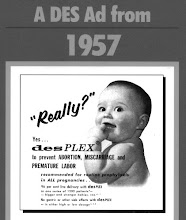 In meeting minutes of the Australian Drug Reactions Advisory Committee and the Australian Drug Evaluation Committee acquired by DES Action NSW, the slowness to act on the DES exposure problem and the reluctance to alert the public are obvious. News of the cancer link to DES was received on 15th October 1971. It was not until 9th September 1972 that a warning was placed in the Medical Journal of Australia. In the late 1970s the Drug Evaluation Committee considered that there would be practical problems and panic and alarm created if a statement were to be released to the lay press. It was considered more appropriate to heighten awareness of the medical profession, so they can be more alert if young women present with vaginal bleeding.
In meeting minutes of the Australian Drug Reactions Advisory Committee and the Australian Drug Evaluation Committee acquired by DES Action NSW, the slowness to act on the DES exposure problem and the reluctance to alert the public are obvious. News of the cancer link to DES was received on 15th October 1971. It was not until 9th September 1972 that a warning was placed in the Medical Journal of Australia. In the late 1970s the Drug Evaluation Committee considered that there would be practical problems and panic and alarm created if a statement were to be released to the lay press. It was considered more appropriate to heighten awareness of the medical profession, so they can be more alert if young women present with vaginal bleeding.
- A 1997 commissioned report by NSW Cancer Council Cancer Control Information Centre to review world data stated: There do not appear to be any reports in scientific literature of cases of CCAC associated with DES exposure in utero in Australia. This report, even in the early stages of the evolution of this problem, would suggest that the Australian experience is closer to 1 case than 24 cases.
In conclusion this report stated that investigations to increase the accuracy of data would not likely alter the advice that there is little justification for specific action aimed at reducing the cancer risk associated with past use of DES in pregnancy.
- In 1998 the Cancer Council NSW made the decision to cease distribution of brochures and posters about DES to centres targeting women throughout NSW.
This decision followed a statement by the then Federal Health Minister, Dr Michael Wooldridge, that the health benefits of setting up a National Register for those affected by DES would be doubtful and may unduly alarm women who may not have taken DES. The Council then considered the brochures to be "too scary" and stated difficulty in dealing with women who couldn't remember if DES was taken. Since 1995 DES Action NSW has assisted hundreds of enquirers, including those unable to remember if DES was taken. As part of the comprehensive 2001 DES Education Campaign in US, an interactive self-assessment guide was designed to assist people in assessing whether or not they have been DES exposed.
- In June 2004 the Therapeutic Goods Administration issued a bulletin item and media release stating that the cancer risk had passed for DES daughters and that they only needed to follow the current national cervical and breast screening recommendations.
[www.ranzcog.edu.au/publications/o-g_pdfs/OG-2000-2003/OG-Contents-May-2003.pdf]
- In 2003 the draft version of Screening to Prevent Cervical Cancer: Guidelines for the Management of Asymptomatic Women with Screen Detected Abnormalities stated that the decision to screen DES daughters will be determined by the level of anxiety the woman usually tolerates about herself, and no firm recommendation can be made.
- Guidelines should be based on medical best practice, not on the patient’s level of anxiety.
- Medical doctors are not expert in determining the level of anxiety in a patient, nor do they have a way to screen/measure anxiety.
- The patient may be anxious for other reasons.
- The statement unethically suggests that medical doctors make a decision for which they are not qualified and one which could deny the patient screening that could be life-saving.
 All too consistent to be coincidental, these management blunders point dangerously towards damage control in favour of pharmaceutical companies. In spite of all available research evidence and recommendations for specific health care, these management activities show great urge to maintain unawareness of DES and to mainstream the DES exposed population to general population health protocols. Already without outward physical signs of exposure, if mainstreamed, DES exposed people will be become even more “invisible” in the health system, whilst having their health seriously jeopardised.
All too consistent to be coincidental, these management blunders point dangerously towards damage control in favour of pharmaceutical companies. In spite of all available research evidence and recommendations for specific health care, these management activities show great urge to maintain unawareness of DES and to mainstream the DES exposed population to general population health protocols. Already without outward physical signs of exposure, if mainstreamed, DES exposed people will be become even more “invisible” in the health system, whilst having their health seriously jeopardised.
For our DES Action group, it is important to always keep our ear to the ground, not only for new research developments about DES, but also for any new government activities concerning DES exposure. All of the above matters regarding management have been or are currently being addressed by DES Action NSW. The continued financial support by members to help us continue our work in ensuring our just and rightful health care is always appreciated.



